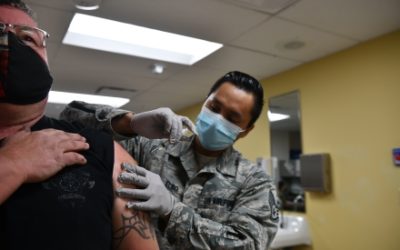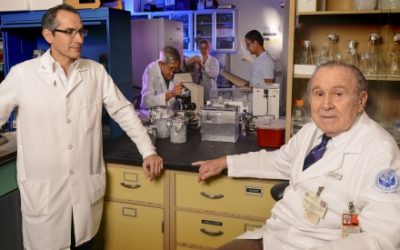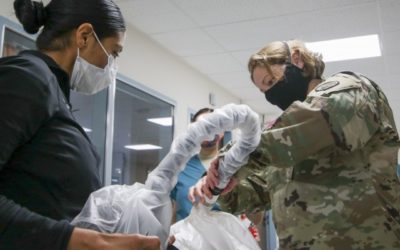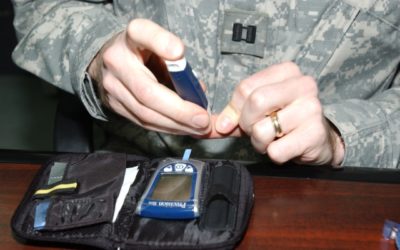HOUSTON – Nivolumab combined with cabozantinib was demonstrated to significantly improve outcomes for patients with renal cell carcinoma in a trial released last year. Now, a new study suggests that dose modifications related to adverse reactions don’t affect efficacy in first-line treatment.
New Cancer Diagnoses Raise Veteran Suicide Rates 43%
ANN ARBOR, MI — Patients diagnosed with cancer are at an increased risk of adverse mental health outcomes, including suicidal behavior. That is especially of concern to the VA because suicide rates among veterans are 50% greater than for non-veteran U.S. adults.
Add-on to Chemoradiotherapy Doubles NSCLC Survival for Some Veterans
ANN ARBOR, MI – Median overall survival doubled for veterans with stage III non-small cell lung cancer who received chemoradiotherapy plus durvalumab, as compared to those receiving chemoradiotherapy alone, according to a new study. The authors note that the current standard of care for patients with unresectable stage III NSCLC is concurrent chemoradiotherapy followed by durvalumab maintenance, but veterans were not included in the trial establishing that protocol.
Will There A New Standard for Care for Some Thyroid Cancers?
PHILADELPHIA — Cabozantinib might become a new standard of care in patients with previously treated differentiated thyroid cancer, according to a new study. Researchers evaluated the efficacy and safety of cabozantinib vs. placebo in radioiodine I-refractory thyroid cancer patients who had progressed during or after prior VEGFR-targeted therapy.
Are Racial Disparities Behind More Secondary Primary Malignancies in MM?
HOUSTON – In the last 10 years, overall survival in symptomatic multiple myeloma has significantly improved because of the use of novel therapies.One result has been an increase in the incidence of second primary malignancies in patients with MM. While more frequent SPMs are related to several factors, researchers qusiton whether racial disparities could be contributing to the issue.
Fertility Can Be Affected by Colorectal Cancer in Younger Patients
NEW YORK — Although colorectal cancer is most frequently diagnosed among Americans 65 to 74 years old, about 10.5% of new colorectal cancer cases occur in those younger than 50 years. Incidence of colorectal cancer in adults aged 40 to 49 years has increased by almost 15% from 2000-2002 to 2014-2016. Yet, according to a study involving VA researchers, too few of the younger patients receive fertility counseling after treatment.
COVID-19 Hypoxia More Common With Poorly Controlled Malignancies
HERSHEY, PA – As has been made clear so far in the pandemic, COVID-19 can range in severity from an asymptomatic viral infection to life-threatening cases of pneumonia, acute respiratory distress syndrome, multi-organ damage and sepsis. Because of their often immunocompromised status, cancer patients are at an increased risk of severe SARS-CoV-2 infection. A study team including Uniformed Services University of the Health Sciences sought to determine why that is so.
Common Drugs Show Promise of Enhancing Immune Checkpoint Inhibitors
ATLANTA – With more cancer patients using immune checkpoint inhibitors drug-drug interactions are of increasing interest. Researchers are finding that some concomitant medications appear to affect outcomes from immunotherapy. The focus was on two drug classes: nonsteroidal anti-inflammatory (NSAID) medications and azole derivatives.
Malnutrition Increases Post-Op Complications in VA Colorectal Cancer Patients
ANN ARBOR, MI – Up to 80% of advanced cancer patients are suffering from malnutrition, although its presence and effects generally are determined by tumor type and stage, according to the National Cancer Institute. Inadequate nutrition also has negative surgical and oncologic impacts, which is why researchers sought to determine the effect of pre-op weight and albumin on postoperative complications in veterans with colorectal cancer at a tertiary care VA hospital.
Predicting Immune Checkpoint Inhibitor Benefit for RCC Patients
ATLANTA – Prognostic scores offer some benefit in determining how patients with metastatic renal cell carcinoma will respond to immune checkpoint inhibitors, according to a recent study. Especially valuable was the modified Glasgow prognostic score (mGPS), which incorporates albumin and C-reactive protein and reflects systemic inflammation.
Autoimmune Patients Fare As Well As Others with PDAC Treatment
MILWAUKEE, WI – The risk of a range of malignancies is increased by chronic inflammation from underlying autoimmune diseases. Furthermore, immunosuppression from treatment often further raises the risk. A new study points out that pancreatic ductal adenocarcinoma appears to be more prevalent with autoimmune disease, but adds some good news: With appropriate therapy, those patients have excellent outcomes. The authors suggest that routine screening might be advisable.
Pandemic Had Dramatic Effect on Care for Prostate Cancer Patients
SAN FRANCISCO – Access to care for men with prostate cancer declined sharply during the worst of the COVID-19 pandemic, and what that means for their prognosis has yet to be determined. A study including VA researchers determined that overall visits a day to clinicians plummeted at one point by 58% in 2020, compared to 2019.
Operation Warp Speed Counts on Collaborations to Combat COVID-19
In a year of grim news, an extraordinary public-private partnership cheered an anxious nation—and the world—with the record-breaking development of multiple vaccines for a deadly virus first detected barely 12 months earlier.
Industry Steps Up to Improve Veterans’ Access to Care
The central focus of the VA over the past five years has been improving veteran access to care.The central focus of the VA over the past five years has been improving veteran access to care. Whether that means enabling veterans to receive care through community programs, expanding telehealth services to reach veterans in rural areas or moving care delivery to more convenient outpatient centers, the department has taken steps with community and industry partners to make it as easy as possible for veterans to receive the care they need when and where they want it.
VA Continues Long History of Industry Partnerships to Improve Veterans’ Care
The VA has long recognized the creativity and problem-solving power that comes from combining a diversity of perspectives with deep expertise.
Working Together: How the VA and Industry Beat HCV in Five Years
The VA’s elimination of chronic hepatitis C (HCV) infections in veterans ranks as one of the great public health success stories of the past decade.
Bayer’s Collaboration to Overcome Barriers to Treatment
Editor’s note: This information was provided by Bayer. The article was not verified or reported by U.S. Medicine.
Our military members are a valuable asset to the security of the nation. For putting their lives on the line, they deserve access to the best medical care
available—both while in service and after they leave the military. But sometimes barriers to treatment can prevent them from accessing the care they need.
US WorldMeds Becomes Partner to Battle The Opioid Epidemic During the Pandemic
Editor’s note: This information was provided by US WorldMeds and was edited for consistency and clarity, but not reported or written by U.S. Medicine staff.
While the COVID-19 pandemic continues to wreak havoc on life in the U.S., closures, staff shortages, and stay-at-home orders have greatly impacted those needing to access the healthcare system for non-COVID reasons.
AstraZeneca Joins Forces with Operation Warp Speed to Defeat COVID-19
Editor’s note: This information was provided by AstraZeneca and was edited for consistency and clarity by U.S. Medicine staff. The article was not verified or reported by U.S. Medicine, however.
Defeating COVID-19 has required an unparalleled cooperation between government and private industry across the globe.
AMSUS Sustaining Members Support Federal Health During the Pandemic
Editor’s note: This information was provided by AMSUS and was edited for consistency and clarity by U.S. Medicine staff. The article was not verified or reported by U.S. Medicine, however.
As the disruption of healthcare caused by the COVID-19 pandemic began to ripple across the country in March 2020,
New Treatments Offer Hope for Spinal Muscular Atrophy Patients
Four years ago, individuals with spinal muscular atrophy (SMA) had no therapies that could slow the disease. Today, three disease-modifying drugs have approval from the U.S. Food and Drug Administration and at least five more have begun clinical trials.
Federal Funds Are Critical to Advances in Spinal Muscular Atrophy Research
For decades, federal grants have provided critical support for research on the causes and potential cures for spinal muscular atrophy (SMA), with ongoing funding from the National Institutes of Health (NIH) and the DoD.
VA’s Multidisciplinary Approach Proves to Be Best for Adult SMA
While much of the research on spinal muscular atrophy has focused on children, adults make up more than one-third of all SMA cases.
Quality of Life Remains Extremely Low for SMA Patients, Caregivers
With new drugs approved for treatment of spinal muscular atrophy, patients and caregivers of patients now have reason to measure progress and to assess quality of life.
New Discoveries Dramatically Alter Understanding of Spinal Muscular Atrophy
Kanaan and Kari Merriken had never heard of spinal muscular atrophy until their son was diagnosed with the disease in 2010. At the time, Kanaan was a staff sergeant with the 75th Ranger Regiment at Fort Benning.
CGM Use Protects Hospitalized COVID-19 Patients, Healthcare Workers
COVID-19 and diabetes have proven to be a deadly combination. For patients infected with the novel coronavirus, diabetes more than doubles the odds of death.
DoD Revises Requirements for Continuous Glucose Monitoring Use
You can’t join the service with diabetes, so why should the DoD care about monitoring blood sugar in those diagnosed with the disease?
Surveillance, Barriers to Care Key to Federal Medicine Fight Against HCC
Mortality rates from most cancers have declined in recent years, but deaths from hepatocellular carcinoma continue to climb. Both the VA and the DoD are moving aggressively to detect and treat liver disease before it progresses to hepatocellular carcinoma (HCC) and to quickly identify patients who have developed this devastating disease.
AGA’s New Advice on Screening for NAFLD and Hepatocellular Carcinoma
The association between NAFLD cirrhosis and HCC is well-established, and most experts believe that screening should be recommended in this setting. The decision to enter a patient into a screening program for HCC is determined by the level of risk for HCC, while also taking into account the patient’s age, overall health, functional status, and willingness and ability to comply with screening assessment.
New Guidelines Expand Screening for Liver Cancer in NAFLD
The American Gastroenterological Association recently updated its clinical practice guidelines to recommend screening for all patients with nonalcoholic fatty liver disease and cirrhosis.





